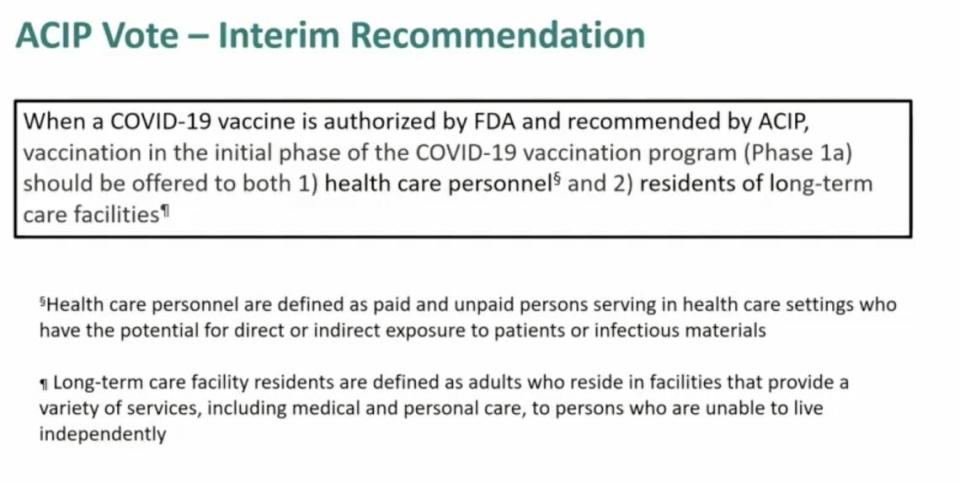Who’s first in line to get the COVID-19 vaccine? CDC reveals priority list
A Centers for Disease Control and Prevention panel advised Tuesday that health care workers and residents of long-term care facilities should be first in line to get the coronavirus vaccine when one is approved by government health officials.
Both groups of individuals are considered at high risk of infection because of their exposure levels to potentially sick people or materials, the CDC’s Advisory Committee on Immunization Practices said during an “emergency virtual meeting.” The committee voted 13-1.
The CDC says it expects 40 million doses of a vaccine to be available by the end of December.
That’s enough to vaccinate 20 million people, but health officials say that doesn’t guarantee all 20 million individuals will be vaccinated by the end of the year. After initial doses are administered, the agency expects 5-10 million doses to be given each week.

The U.S. Food and Drug Administration is scheduled to meet Dec. 10 to review clinical trial data for the Pfizer-BioNTech vaccine candidate, which was sent to the FDA on Nov. 20. Moderna said an FDA meeting for its vaccine candidate is expected to take place on Dec. 17.
Both companies applied for an emergency use authorization, which would allow the use of their still “unapproved” vaccine in emergency situations, such as a pandemic, to help fight against COVID-19, for which “there are no adequate, approved, and available alternatives.”
If granted approval, Americans can start getting vaccinated as soon as late December.
Dr. Karen Landers, spokeswoman for the Alabama Department of Public Health, told CNBC that the decision Tuesday is not legally binding, but rather a strong recommendation.
“This guidance will be extremely helpful because it will be science-based, and also will give us the framework to be able to ensure that our guidelines are consistent with what is recommended by support staff,” she said. “The Alabama Department of Public Health will follow those recommendations, and we’ll certainly be following what [the CDC panel] recommends in terms of the vaccine administration.”
The news comes after top members of Operation Warp Speed — a program created in May by the government to produce and deliver COVID-19 vaccines — told reporters Nov. 22 that the first doses will be given to states based on population size.
The new distribution plans split from earlier ones that said the first doses of a coronavirus vaccine will go to states based on the number of people in high-risk groups, such as health care workers, first responders, people over 65 years old, and individuals with underlying medical conditions.
Operation Warp Speed officials also said the first 6.4 million doses of a coronavirus vaccine will be distributed to all states and territories around mid-December, McClatchy News reported last week.
The recommendations were suggested by the Advisory Committee on Immunization Practices — an outside group of medical experts that advises the CDC.
Along with its FDA emergency authorization request, Moderna revealed the final results of its 30,000-person phase 3 clinical trial for its COVID-19 vaccine on Monday.
Two weeks after a second dose, 185 people in the placebo group contracted COVID-19 while only 11 who actually received the vaccine got infected, resulting in an efficacy rate of 94.1%, according to the company. This means there was a 94.1% reduction from the number of cases you would expect if trial participants had not been vaccinated.
Most surprising, the Moderna candidate had 100% efficacy against severe COVID-19.
There were 30 severe cases reported in phase 3, but all of them belonged to the placebo group that did not receive the vaccine.
“I would still like to see all of the actual data, but what we’ve seen so far is absolutely remarkable,” Paul Offit, a vaccine researcher at the Children’s Hospital of Philadelphia and member of an independent committee of vaccine experts that advises FDA, told Science of the Moderna vaccine.
American Airlines CEO Doug Parker announced in a LinkedIn post last week that the company “successfully moved a trial of a major pharmaceutical company’s thermal packaging from Miami to South America.”
It’s one of the latest efforts to test-run the shipping of COVID-19 vaccines, which experts say will be difficult. The Pfizer vaccine, for example, must be kept at around minus 94 degrees Fahrenheit, according to ABC News.
The airline told the outlet that it has created a “network of team members that specialize in temperature-critical shipments,” and that it is working with the Federal Aviation Administration on “regulations governing shipments transported with dry ice.”

